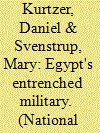| Srl | Item |
| 1 |
ID:
123643


|
|
|
|
|
| Publication |
2012.
|
| Summary/Abstract |
FIFTY YEARS ago, drawn to the perceived dynamism of fresh, young military leaders, scholars and policy analysts became enamored of the potential role of the military in political, economic and social modernization. The "man on horseback," as S. E. Finer described it, was seen as best positioned to effect the transition from developing to modern societies. The military, it was believed, could draw on the institutional cohesion and its monopoly of coercive power to marshal the resources and will necessary to push societies forward. Egypt was studied as a prime example.
|
|
|
|
|
|
|
|
|
|
|
|
|
|
|
|
| 2 |
ID:
178542


|
|
|
|
|
| Summary/Abstract |
This article analyzes a popular Mubarak era film series (al-Limby) and a post-uprising satirical television programme (al-Bernameg) to show how humour has a powerful capacity to create nonsense out of the ‘sense’ that authoritarian regimes attempt to impose on society. In the Mubarak years, such films presented criticism of rising economic inequalities and state oppression. Post-2011 uprising satire similarly became a primary site for criticism of state oppression and regime politics. They were examples of a redistribution of the nonsensical (drawing on Rancière) and gradual creative insurgency (drawing on Kraidy). Yet at the same time, even seemingly revolutionary humour can reproduce hegemonic ‘common sense’ that upholds broader social hierarchies, particularly those related to gender, class, and religion. Thus, this article argues that humour can be critical to both revolutionary and counter-revolutionary sense-making.
|
|
|
|
|
|
|
|
|
|
|
|
|
|
|
|